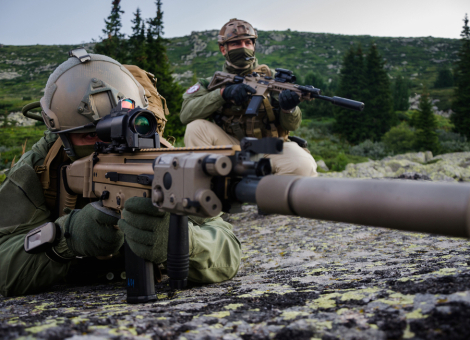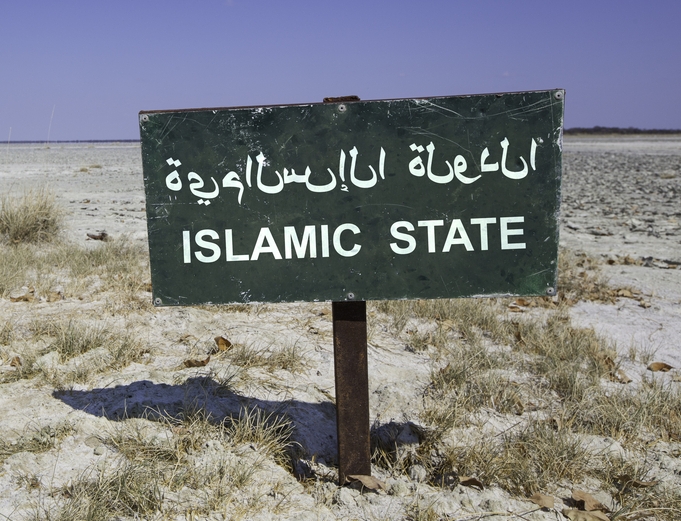
It has now been more than a month since the stated policy of the United States became to “ultimately destroy” ISIS. To achieve this goal, the president informed the world that U.S. airpower will be unleashed but that the strategy “will not involve American combat troops fighting on foreign soil.”
The past month has witnessed a single day, September 23, during which the U.S. and coalition air forces launched the type of assault that characterized the air campaigns during the first Gulf War and the subsequent invasion of Iraq. But even this single day of intensive effort pales in comparison to the typical daily effort in those two earlier campaigns. During Desert Storm in 1991, coalition forces flew over 110,000 sorties during 42 days of combat, an average of over 2,600 per day. During the invasion of Iraq in 2003, coalition forces flew over 41,000 sorties during the first 41 days of combat (through the “Mission Accomplished” speech), an average of over 1,000 per day.
During the two months since U.S. airpower intervened to slow down ISIS in Iraq, coalition forces have averaged about 81 sorties per day over a theater of operations that is actually larger than either of the earlier two conflicts. The result of this half-effort has been failure. ISIS quickly modified its tactics in reaction to the new threat from the air and is once again on the offensive. The fate of the small border town of Kobani in Syria, despite being within 165 miles of the major NATO airbase of Incirlik in Turkey and within a rifle shot of the Turkish Army, is in doubt. Almost unbelievably, Baghdad is now threatened by ISIS forces.
Of course, this simply shows that airpower alone is unable to stop a determined military force. History gives us ample proof. Despite the massive and relentless bombing of Germany and Japan on a scale that eludes recent experience, both nations actually increased war production until the final months of the war.
The president has repeatedly stated our strategy to support the ground forces indigenous to the region. Specifically, he is counting on the Kurdish Peshmerga and the Iraqi Security Forces inside Iraq, and the Free Syrian Army inside Syria. Even better would be to somehow entice or cajole the powerful Turkish Army into Syria. So let’s look at each of these options.
The Peshmerga are a real fighting force that is motivated and competently led. A meaningful number of U.S. Special Forces are already embedded with the Peshmerga as advisors and potential forward air controllers. But while the Kurds will fight feverishly for Kurdish land, they are highly reluctant to advance into the Sunni territories of Iraq and Syria now held by ISIS.
The Iraqi Security Forces have collapsed, the inevitable result of the sectarian rule of Nouri al-Maliki. Mr. al-Maliki, a Shiite, immediately began to purge the Iraqi Army of its professional cadre of Sunni officers after the withdrawal of the U.S. military at the end of 2011. His actions drove the Sunni tribes into the willing arms of ISIS. Mr. al-Maliki is gone now, but the damage he inflicted rendered worthless the U.S. investment in Iraq.
The Free Syrian Army, or FSA, is the rebel coalition that Obama refused to support during the last two years. How ironic that we now turn to the FSA as the cornerstone of our strategy to defeat ISIS inside Syria. Supporting the FSA makes sense, but the reality is that it is not now, and is unlikely to become anytime soon, a military force capable of defeating ISIS – especially while it is simultaneously in a life and death struggle with the Assad regime.
As for Turkey, the internal pressures and passions that drive its politics are too numerous and involved for this article. But what is important to know is that their primary goal is to see the collapse of the Assad regime. They are no fans of ISIS, but in their world view, destroying ISIS now only benefits Assad. For President Erdogan of Turkey to order his army to attack ISIS is unlikely unless a couple of conditions are met – more about that later. To make matters worse, Turkey fears a powerful Peshmerga almost as much as it fears ISIS.
Where does this leave the U.S. strategy? First, the bad news is that ISIS is not only proving itself to be a competent military force, it is also attracting new recruits by the thousands and is increasingly well financed. The feckless U.S. air campaign is only enhancing the stature of ISIS as the standard bearer of extremist Islam. Time is not the ally of the West. ISIS combat forces have more than tripled in size so far in 2014 and that rate of growth is accelerating if anything.
The only capable ground fighting force available to put ISIS on the defensive is the Turkish Army. What will get them involved? Turkey wants Assad gone and they will not enter the fray if they are convinced they are alone in the fight. Unfortunately, the elephant in the room is a prevailing view in the Middle East that President Obama does not have his heart in this situation and will waver over time. To our many allies in the region, the stated policy of no ground troops is proof of Obama’s lack of commitment. After all, stopping an air campaign is quite easily accomplished.
As President Obama dithers, ISIS grows stronger and continues to advance. If ISIS takes Baghdad, we will witness another humanitarian crisis, this time it will be millions of Iraqi Shiites fleeing into Iran. What is left of the Iraqi fighting forces will be gone. Even worse, we will face a situation in which we either accept an ISIS caliphate that controls Iraq and much of Syria, or we will have to invade Iraq again with a force similar in size to the 2003 invasion.
To get our floundering coalition motivated – and the Turks in the fight – will take U.S. commitment. No one in the region will believe we are committed until meaningful U.S. ground forces are committed to the fight. These are the wages of U.S. disengagement and presidential wavering of recent years.
Why care about a growing Islamic caliphate in the heart of the Middle East led by ISIS? After all, we could sit this out and let millions of Muslims – Sunni and Shia – determine their own destiny. Whenever I ponder this question, my mind always returns to a scene in the movie Terminator, you know the one I mean: ISIS doesn’t know compassion or mercy, it can’t be bargained with or bought off, and it won’t stop – ever – until we are dead.
